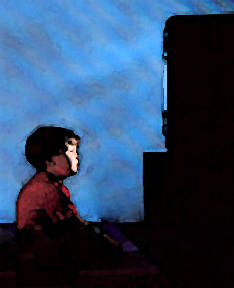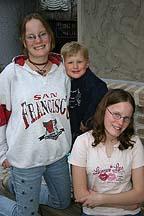 Oh, The Humanity
Oh, The HumanityScotty Roberts
Ronald Reagan was the very first president I helped elect into office. Twice. Much to the chagrin of my Minnesota DFL (Democratic Farm Labor) relations, and my died-in-the-wool Liberal, Communist grandfather, I was the family’s token black sheep; the young turk Conservative. Call me the “Alex Keaton” of my family, the tie-wearing, church-going, Reagan revolutionary. For me, Conservatism was the political manifesto of God, and as a bible thumping, ministry-bound seminarian, I laced my speech and actions with the finer points of Reaganomics, and lauded the presidential pink-slipping of striking air traffic controllers. The 1980s was most definitely the Age of Conservatism, with its military build-up that bolstered the Reagan version of Roosevelt’s “walk softly but carry a big stick” philosophy, and the unfettered growth of corporate America, who proved to me over and over again that greed – in it’s proper perspective - was indeed good.
Ah, those were the days! Life was good for me, and as seen through my youth-colored-glasses, there were only better days ahead, filled with a bright future for my country. As long, that is, as Reagan could get around that pesky constitutional prohibition on his running for a third, maybe even fourth term, age notwithstanding.
One thing that has been seared into my mind over the years is that the older I get, the less I know for sure. When one begins to question entrenched beliefs, it rarely comes on the epiphanous lighting bolt of a decisive moment in time. It, rather, rides the slow oxen of the westward bound pioneer, who watched the familiar landscape gradually transform from the Appalachian forests to the prairies and the jagged peeks of the Rocky mountains beyond. My landscape has changed, but it was not an overnight process, nor did it lead me to the far end of the political spectrum. While I held true to the Reagan Conservatism of my youth - and still do in many ways – I found myself combating the hard line of ConservaTIVES who seemed to evolve into a form that I found was no longer representative of what I believed as a Human Being.
Oh, and there it is. Human Being-ism. I have morphed from being a political idealogue into being a humanist - and I use the small “h” deliberately, as to not be confused with the philosophical mindset of Humanism. Though disagreeing vehemently with his politics, I remember the words of my grandfather, who told me a very long time ago, his eyes filling with genuine tears, that he could no longer love a country that could let children and poor people suffer, while he and others who had means simply lived as though they didn’t exist. “The poor and downtrodden in life are invisible,” he postulated. At the time, I brushed him off as spewing socialistic jargon, but his words made great impact on my deeper thinking, despite the years it took for me to come to that realization. I think his words molded my psyche more than I would have admitted had I been cognizant of it at the time.
I have a great love of history, and one of my areas of personal study and research has been the nineteenth century expansion into the American West, more recognizable in the Conservative mindset as the Eminent Dominion over a Conquered People. Though a man of Welsh-Scot descent, I have always been intrigued with Native American studies. My own blonde-haired, blue-eyed children are an eighth Oneida (one of the tribes of the Six Nations), and I felt it was good for them to grow up knowing about all the elemental aspects of their heritage. I remember an argument that ensued in the mid-1990s between my in-law relatives and me while sitting around the Thanksgiving table. The heated discussion arose when my brothers-in-law – all avid anglers – were expressing their vehemence that treaty rights with the Milacs Band of Ojibway be rescinded. They were supporting a new legislation that would eliminate nineteenth-century tribal fishing rights on Lake Milacs. Their argument was that the Ojibway were taking too many fish, leaving none for the anglers and tourism-driven summer vacationers. Well, believe me when I tell you that the shit hit the fan when I reminded my fishermen brothers-in-law, that the treaty with the Ojibway included the phrase, “in perpetuity,” meaning that the terms of the treaty would be, in essence, “forever.” The business of summer tourism and fishing had suddenly become more important than the United States and the State of Minnesota upholding it’s end of a treaty, rendering the words “in perpetuity” null and void as soon as economics came into the mix. The Conservatism of my in-law family members outweighed the efficacy of the contract made with the Ojibway. They were ready to wage a new war on the Native American peoples of central Minnesota.
And this scenario has been reenacted time and time again with Native Peoples, from gold in the Dakotas to uranium in New Mexico. My Conservatism would tend to support the notion that this is a new age, and money should talk while bullshit should walk, letting economics and greed determine the civility, heart and humanity of the situation. The age-old cliché of the black-caped, top-hatted land developer tying the hapless, helpless farmer’s daughter to the railroad tracks was reliving itself in different forms all around me. And while I supported the conservative belief that money, development, industry and greed should have dominion over contracts, natural resources and common human decency, I felt that my humanity was being compromised.
I remember working for a big, commercial printing house in Lynchburg, VA, back in the early 1980s. I was a fresh-faced kid, working on my theological education and continuing to construct my conservative views. One of the biggest clients we serviced was Jerry Falwell’s Moral Majority, headquartered right there in Lynchburg. This was for me - a Reagan Conservative - like living in heaven’s backyard. One morning I was picking up some paperwork at the offices of the Moral Majority, and I had to make a quick stop in the men’s room. While I was conducting my brief business, a member of the Moral Majority’s senior staff entered the lavatory. I recognized him and he had seen me around, as well. We did the polite chit-chat that takes place between guys standing at public urinals, when he simply blurted out how much he hated “homosexuals.” He even paraphrased the words of Indian hating General Sherman by shouting out, “The only good faggot is a dead faggot!” I was in stunned silence, mortified that a senior member of the Moral Majority’s staff was decrying Gays while we both stood, holding our respective penises in our respective hands. All I could mumble out was, “I kinda see the love of Jesus as inconsistent with lynching homosexuals.” He spent the next several minutes berating my words, and telling me what a true Conservative ought to believe on the matter. That incident was one of the earliest remembrances for me of a Conservatism that aligned itself with God, yet so contradicted the love of God. This began my trek down the path of confusion: If Conservatism was good, how could it hold to ideals that seemingly contradicted goodness? And this defines the internal struggle I am engaged in, even to this day.
Now, perhaps I am being a little harsh with my Conservative brothers and sisters. I still hold to many certain Conservative ideals, but I have begun to temper those ideals with more heart and humanity – at least to a greater extent than I did before I started understanding how much more important those things were. And this has led to an innate confusion; the colliding of two internal trains heading toward each other on the same set of tracks. I understand and adhere to the Conservative ideals of personal responsibility and learning how to fish rather than being handed a free fish. I believe that all men are created equal, that they are endowed by their Creator with certain unalienable Rights, that among these are Life, Liberty and the pursuit of Happiness – not the guarantee of fairness. I know in my heart of hearts that the government that rules least is the government that rules best, and that smaller government, non-invasive taxation, the right to bear arms, and being a nation of Law is essential to the continued life of the United States of America. But where I start to drift from the mainline Conservative agenda is when I see human beings falling through the cracks of the decking of American Conservatism. You can’t eat idealism. Smaller government never prevented a needy family’s electricity from being shut-off for inability to pay. Sure, maybe in the long run our system of free enterprise can establish a better future for everyone, but what do people do while Conservatives are attempting to build their own version of Utopia?
Somewhere in the mix we as Conservatives have lost touch with our humanity. We promulgate great things that can happen down the road, but have no failsafes for the people caught in the mix of political rivalry. I have always believed that congressional gridlock is a good thing – the slower government moves, the better for anyone with a purse or wallet. But in the midst of all the fighting and political maneuvering, the people lose.
I am not talking about religion or moral majorities, but rather, about placing humanity above politics. We are to be good stewards of our planet and it’s inhabitants. We need to downsize government while at the same time finding ways to not let people fall through the cracks. We must strive at all times to uphold and defend the Constitution in its original intent, and in living recognition of Life, Liberty and the pursuit of Happiness, not leave people behind, but help create opportunity. And in the meantime, help those who cannot help themselves.
I find myself from time to time wondering how Ronald Reagan would handle current foreign or domestic governmental crisis – W.W.R.D. – “What Would Reagan Do?” But as I grow older, I find myself internalizing things and letting them affect me on a much more personal level. So the real question I need to ask is not how my party or it’s representatives should handle things in my place, but how I, as a citizen of this great country and a free-thinking individual possessing personal freedom and God-given liberty, live and act like a Human Being. Conservatives and Liberals be damned












